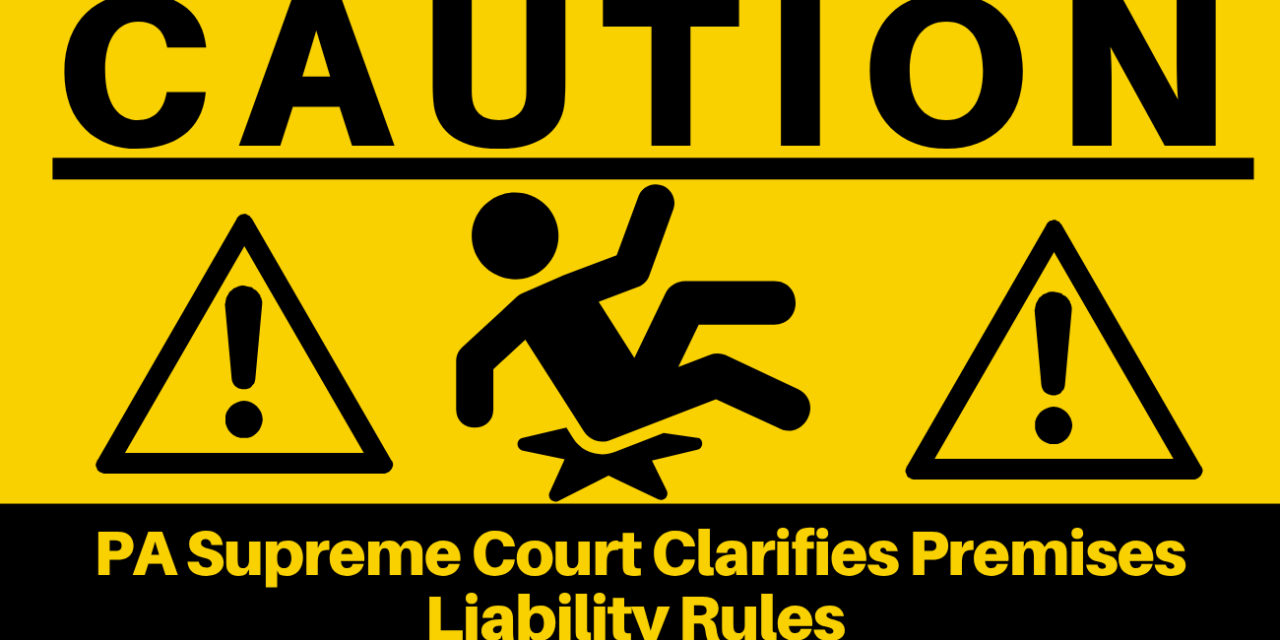What This Means for Trip-and-Fall and Dog Bite Cases & The Case That’s Changing How Premises Liability Lawsuits Work!
In 2025, the Pennsylvania Supreme Court decided Simone v. Alam, a case that quietly but powerfully reshaped how lawyers handle premises liability claims the cases that come from slip-and-falls, trip-and-falls, dog bites, or any injury that happens on someone else’s property.
The Court ruled that a co-owner of property isn’t automatically an “indispensable party” in a lawsuit meaning you can file or move forward with your claim even if every technical owner isn’t listed on the complaint, as long as the person you are suing had possession, control, or responsibility for the property where you got hurt.
This may sound like legal nit-picking, but in the real world, it’s huge especially for injured people who’ve slipped on icy steps, tripped on loose tiles, or been bitten by a dog in a shared household or rental property.
What the Supreme Court Actually Said
Before this decision, defense lawyers often argued that cases should be thrown out if all owners weren’t named even if one owner clearly controlled the property.
In Simone v. Alam, the plaintiff was injured on property jointly owned by a married couple. The injured person sued the wife, who lived there and maintained the premises, but didn’t sue the husband, who co-owned the title but had no involvement in maintenance.
The defense tried to get the case dismissed, arguing that both owners had to be included.
The Supreme Court disagreed.
It ruled:
“An indispensable party must have a legally enforceable interest that will be affected by the outcome. Mere title ownership, absent possession or control, is not enough.”
Translation:
If you slip, fall, or get bitten, you can hold the person in charge of the property responsible even if they’re not the only one on the deed.
Why This Ruling Matters for Premises Liability Victims
You don’t lose your case because of paperwork.
Injured victims no longer risk losing valid claims just because the property title lists multiple owners.
Focus shifts to “control” not just “ownership.”
Premises liability always hinged on control who had the duty to make the property safe. Now the law clearly aligns with that principle.
Landlords, tenants, and property managers are on notice.
If you maintain, manage, or profit from a property, you can be held liable for unsafe conditions even if you’re not the sole owner.
Premises Liability Real-World Example: The Winter Sidewalk Trip-and-Fall
Imagine a Scranton resident slips on an icy sidewalk outside a duplex. The deed lists two co-owners siblings. One lives there and shovels the walk. The other lives out of state and hasn’t been there in years.
Before this ruling, defense attorneys might argue both siblings needed to be sued or the case would be tossed.
Now, the law is clear:
If the local sibling controlled the property’s condition, the case moves forward against them. The out-of-state sibling’s name on a piece of paper doesn’t automatically block justice.
That single clarification saves countless injured Pennsylvanians from legal red tape and gives trial judges a clearer framework to follow.
The Premises Liability Dog Bite Connection
Dog bite cases often involve property shared by family members or roommates one person owns the house, another technically owns the dog, and both live on the premises.
Under this ruling:
-
You can sue the person who had custody of the dog or control of the property at the time of the attack.
-
You don’t need to name every person on the mortgage or every adult who’s ever lived there.
-
If the person responsible for controlling the animal or property fails to keep it safe, they can be held accountable.
Example:
A visitor is bitten by a dog in a rented home jointly owned by two relatives. One relative lives there and owns the dog. The other lives elsewhere.
The injured visitor can now pursue the resident owner — the person with control — without the case getting derailed over “missing parties.”
How It Affects Slip, Trip, and Fall Claims
This ruling directly impacts slip-and-fall and trip-and-fall lawsuits, especially those involving:
-
Apartment buildings or duplexes jointly owned by family members.
-
Rental properties managed by one sibling, spouse, or partner.
-
Commercial spaces co-owned by business partners where only one handles maintenance.
If you slipped on a wet floor in a shared property or tripped over broken steps outside a co-owned home, you no longer have to chase down every partial owner. You can file against the individual actually responsible for safety.
Why It’s Important for Pennsylvania Renters and Landlords
Pennsylvania has thousands of multi-owner properties from small Scranton rentals to multi-unit complexes in Pittsburgh or Philadelphia. This case sets a clear rule:
Whoever controls or maintains the space owes the duty of care not necessarily everyone with a name on the deed.
That matters for:
-
Tenants: You can sue your landlord even if other people co-own the building.
-
Landlords: You can’t hide behind co-ownership to avoid liability.
-
Property managers: If you handle maintenance or collect rent, you can be named in a premises suit even if you’re not the deed holder.
What This Means for Dog Bite, Slip-and-Fall, and Premises Liability Lawyers
At Pisanchyn Law Firm, we’ve handled thousands of cases across Pennsylvania involving unsafe property conditions and dog attacks. This ruling reinforces something we’ve always fought to prove in court:
It’s not about whose name is printed on a piece of paper it’s about who had control and failed to keep others safe.
That principle is now codified at the highest level of Pennsylvania law, which means faster progress for clients and fewer frivolous dismissal motions from insurance defense attorneys.
Common Examples Where This Ruling Applies
| Scenario | Before Ruling | After Ruling |
|---|---|---|
| Trip-and-fall at a home owned by married couple, one absent spouse | Defense could argue both must be sued | Case can proceed against resident spouse who controlled property |
| Slip on steps outside a multi-unit rental owned by siblings | Plaintiff risked dismissal for not naming all | Case moves forward against managing sibling |
| Dog bite at a house co-owned by parents, but adult child owns the dog | Case complicated by ownership overlap | Focus is on who controlled the dog/property |
| Injury at co-owned business property | Lawsuit stalled over corporate structure | Proceed against the partner managing daily operations |
Why This Helps Injury Victims in Practice
Premises cases already face uphill battles — insurance adjusters delay, property owners deny, and evidence disappears fast.
This ruling removes one more excuse defense attorneys use to drag things out. Now, injured Pennsylvanians can:
-
File their claims sooner.
-
Keep cases from getting dismissed over paperwork.
-
Get compensation faster for medical bills, lost wages, and pain and suffering.
How Pisanchyn Law Firm Uses This Ruling to Strengthen Cases
When we handle a trip-and-fall, slip-and-fall, or dog-bite case, one of the first things we determine is who had control not just ownership.
That can include:
-
The landlord who failed to fix loose stairs.
-
The tenant who left icy sidewalks untreated.
-
The homeowner who didn’t secure a dangerous dog.
By focusing discovery on control and maintenance responsibilities, we build stronger negligence cases that meet the new Supreme Court guidance head-on.
Tying It All Together — Amazon, Premises Liability, and Worker Safety
This case might sound unrelated to the Amazon injury stories we’ve covered before — but the core principle is the same:
When someone controls a space and fails to keep it safe, they’re responsible for the harm that follows.
Whether that’s a warehouse floor covered in broken pallets or a front porch covered in ice, control equals accountability.
Just like Amazon can’t dodge responsibility for unsafe working conditions by blaming subcontractors, property owners can’t dodge responsibility by pointing to co-owners who had nothing to do with maintenance.
If You Were Hurt on Someone Else’s Property
If you suffered a slip, trip, or fall — or a dog bite — anywhere in Pennsylvania:
Seek medical attention immediately.
Document the scene — photos, witness names, and contact info.
Report it to the property owner or manager right away.
Call Pisanchyn Law Firm before talking to insurance adjusters.
Premises-liability law is complex — but this new decision gives injured people a stronger path to justice. We’ll make sure you take full advantage of it.
Final Thought
The Pennsylvania Supreme Court’s Simone v. Alam ruling is a win for injury victims. It ensures that justice focuses on who had control not just whose name is on the deed.
If you were injured in a trip-and-fall, slip-and-fall, or dog bite anywhere in Pennsylvania, don’t wait. Evidence disappears quickly but your right to hold negligent property owners accountable does not.





